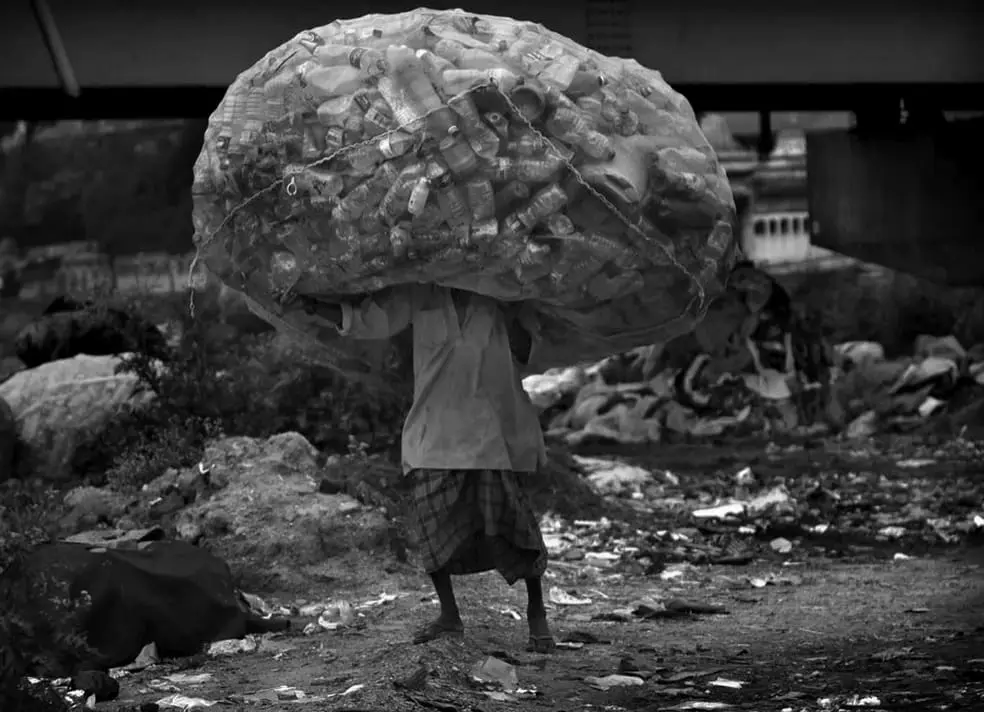
AND Editorial – The Old Order on Shifting Sands
We hereby share an unofficial translation of the latest editorial from A Nova Democracia (AND).
The World Social Report 2025, prepared by the UN itself under imperialist leadership, records some key elements for assessing the unprecedented degree of decomposition of the imperialist system. Its diagnosis, even when coming from a source of global reaction, known as the “International Community,” can no longer hide the whole reality. Despite its numbers being doctored, they are still revealing the seriousness of the state of the imperialist system. The report defines the situation as a “global social crisis,” aggravated by “economic insecurity,” “growing inequality,” and “declining trust in institutions.”
According to the report, more than 2.8 billion human beings live on incomes between $2.15 and $6.85 per day, which naturally leads to life in subhuman conditions, and in no way can they live, in the full sense of the word, in this system of brutal oppression. Nevertheless, more than 65% of the global population lives in countries where conditions of “inequality” are worsening—that is, the indecent concentration of wealth is growing at the same rate as the mass of the poor. Not without reason, the majority of the population, as recorded in the report, reports little or no confidence in governments, especially among younger people.
Not only the UN, but also other imperialist think tanks such as the US-based Freedom House, the British Economist Intelligence Unit (EIU), and the Swedish Varieties of Democracy (V-Dem), although using different indicators, all concluded in their 2025 annual reports that “democracy” (i.e., old bourgeois democracy) continues to decline overall. V-Dem highlights the “increase in political violence” and a “wave of autocratization” that has grown rapidly over the past 25 years worldwide, and that the US is undergoing its “fastest-evolving episode of autocratization in modern history” and on an “unprecedented scale.” No wonder, right? It takes a lot of cynicism to hide the sun with a sieve, since the imperialists have stopped their attempts to conceal the severity of the crisis, and the lies no longer stick as they once did.
The truth is simply this: the greater the concentration of wealth in one pole and poverty in the other, the greater the need for bourgeois States to increase their reactionary tendencies, with restrictions or revocations of already meager democratic freedoms—“autocratization” is nothing more than the march of bourgeois democracy toward presidential absolutism, with increasing fascist measures and toward fascism itself. Monopoly capital, that is, imperialism, being a tendency toward violence and reaction across the board, politically is the war of aggression against nations oppressed by imperialist nations and the division of the world among them. It is, therefore, since the First Imperialist World War, from a social point of view as social-chauvinism, the bourgeois democratic republic’s senility, even under the management of social democracy, produces nothing more than frustration and resentment among the people’s masses with the failure and bankruptcy of this bourgeois left; it is the basis from which the far right has emerged throughout the world in the last decade.
The Carnegie Foundation, in turn, through its “Global Protest Monitor,” states that “large-scale anti-government protests with a strong political character are multiplying in various regions.” It also says that “mobilizations in many countries” have been growing since 2024, driven mostly by “autocratic pressure” and “anti-democratic actions by governments”: where there is oppression, there is resistance, and the explosiveness of the masses reaches unprecedented levels. Thus, the “Monitor” reports that in the last 12 months (until September 1), there have been more than 142 “significant anti-government protests,” many lasting days or even months. These are clearly pre-insurrectionary tendencies, which mark the development of the revolutionary situation throughout the world, albeit unevenly, whose people’s uprisings point to the historical end of the imperialist system and its political forms, and the political tendency toward its replacement. Obviously, this is contingent on the existence of a proletarian leadership to guarantee the course of social transformation, to provide these uprisings with the strategy and tactics indispensable for victory—in short, revolutionary parties of the proletariat.
***
A very concrete expression of this has been Latin America, which is increasingly becoming the weakest link in the chain of imperialist domination, amidst the formidable general crisis of the system, being the “backyard” of the sole hegemonic Yankee superpower, which, in clear decline in its world domination, finds itself threatened by economic instability, intensification of the class struggle, and people’s uprisings in its countries, and which draws on the rich experience of the People’s War in Peru.
The tale of “stability” on the subcontinent is slowly dying. In Peru, popular uprisings, involving fierce combats that have cost lives, have already deposed coup leader President Dina Boluarte, and the person now taking office is the seventh president in just 10 years: in short, a country ungovernable due to brutal social antagonism and unprecedented demoralization of its old order, in which a revolution is underway, albeit facing the difficulties inherent in any great undertaking. Ecuador is no different: the uprising of peasants, indigenous peoples, and other people’s sectors also points to the high cost of living, which is exacerbated by rising fuel prices, but not only that: the anger of the masses is growing against the abuses, corruption, and oppression of an increasingly fascist and traitorous government.
The old bourgeois democracy—or, in the case of semi-colonial countries, its bureaucratic-feudal simulacrum with institutions emptied of republican content—is incapable of “resolving conflicts.” It’s true meaning is seen by the masses for what it really is: an instrument through which the rich – the local ruling classes subservient to imperialism, mainly Yankee imperialism – impose repression and sell illusions to the poor, and deserves no trust.
The same is happening in our country, of course, as evidenced by the increase in rural areas, of incidents in which armed peasant self-defense groups repel paramilitaries commanded by high-ranking military police officers, in addition to being integrated by police officers who are increasingly well-armed and structured with direct and active support from those same official repressive corporations. Peasants and other poor masses of the countryside do not consent to the representation of this or that politician, judge, prosecutor, of the (false) “left” or right, or anything that comes from Brasilia or elsewhere, because they have instinctively learned that it is evil.
Instead, they prefer to rely on their own strength and organizations, increasingly in opposition to the so-called “democratic rule of law,” and the fault lies with the latter for not being—and not being able to be—democratic or “lawful.” The class struggle will only deepen and take on an ever-greater form in the Agrarian Revolution, a political perspective that points to a New Brazil, a government of workers, peasants, honest intellectuals, and small and medium landowners. Everything points to a revolutionary upsurge in the countryside, as Chairman Mao Tsetung once said in the early months of the Agrarian Revolution of 1924-27 in ancient China.
***
After the Palestinian National Resistance imposed the ceasefire agreement, the media monopolies around the world were quick to proclaim the ultra-reactionary Donald Trump as the great architect of the “peace plan.” Trump even hoped to win the Nobel Peace Prize, but since awarding it to him would be too demoralizing (as was the awarding of the prize to the genocidal Obama in 2009, at a time when US hegemony was not as contested as it is today), they ended up giving it to another lackey aligned with imperial plans, in this case, a gusana whose name is so unimportant that we will not even mention it. The newspapers also said that Hamas was “pressured” by the US threat to “eradicated” it! More likely, however, is that the leaders of the Resistance saw the nonsense as a bad joke. After all, how does it differ from what the Yankees and Zionists have been saying for the last 80 years, and particularly in the last six months? Hence the forceful response from the senior leadership of the Palestinian National Resistance, saying that the continuation of the armed struggle and the rejection of disarmament are non-negotiable!
Let the Nazi-Zionist hyenas laugh, especially the Antichrist Benjamin “Satanyahu,” while they can. The genocide against the Palestinian people, a sinister attempt that will go down in human history alongside the Nazi concentration camps as the most heinous and despicable examples, has not been able to wipe out this intrepid people, a mark of the best that humanity has produced in these times. The Palestinian sacrifice has raised the masses across the planet and urges the oppressed of the Earth to rise up against their tyrants. The Nazi-Zionist entity has its rotten entrails exposed. Thus, the streets and fields overflow with infinite love for the wonderful Palestinian people and merciless hatred for Zionism and its bootlickers around the world. Long live Blessed Palestine!

